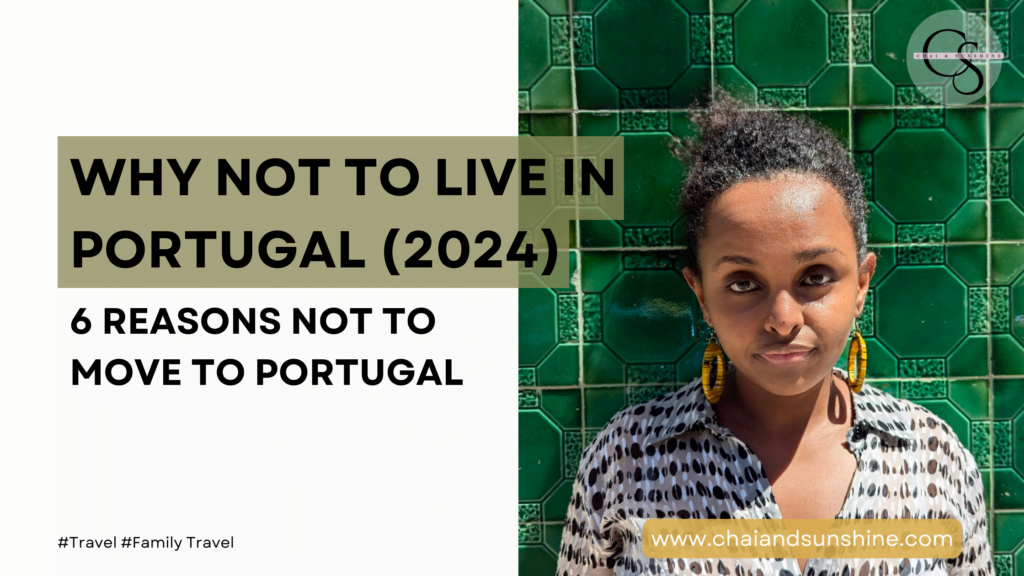
Portugal.
Of late, Portugal has captured hearts with its promise of sunshine, affordability, and a laid-back lifestyle. I mean, we moved here in September 2023 and haven’t looked back.
But before you pack your bags and book a one-way ticket, it’s essential to consider the potential downsides.
While my family and I have thoroughly enjoyed our expat adventure here, there are certain aspects of life in Portugal that might not suit everyone.
Let’s dive into 6 reasons why NOT to live in Portugal.
Table of Contents
Toggle1. Portugal's Laid-Back Pace and Bureaucracy May Drive You Nuts
Portugal is renowned for its relaxed atmosphere, which is undoubtedly a huge draw for many.
But if you’re used to the fast-paced hustle and bustle of a big city, the slower pace of life here might feel like a drag.
Most gyms open after 7am, and many restaurants close after lunch and before dinner, probably for a siesta.

Hand-in-hand with the relaxed pace of life is Portugal’s bureaucratic system. From obtaining residency permits to dealing with taxes, expect plenty of paperwork, multiple trips, confusion, and waiting around.
For example, one year in, I’m still waiting on my residency permit (I’m a South African national). I was told I’d have my residency permit within 6 weeks.
I’m now in month 6, with no indication when it’ll arrive. (“Don’t worry, it sometimes can take a year,” a well-meaning Portuguese bureaucrat told me. Great.)
The courts also close completely from 16 July to 31 August, adding to an already large backlog, so it’d be wise not to need legal justice in July.
Despite this, I still find Portugal remarkably easy to get settled into. I think it’s because I’ve lived in South Africa, Ethiopia, and France, and have inadvertently become a professional bureaucracy navigator. But I find the laws and civil servants here to be fair and not out to make life harder.
Good luck to you Americans, British, and Australian/ New Zealanders with low bureaucracy thresholds. Take some yoga and meditation classes before moving here.
2. The Cost of Living Isn't Always as Low as You Think
3. Portugal's Real Estate Market: Yikes!
The Portuguese real estate market can be a minefield for locals and foreigners alike!
In cities like Lisbon and Porto, property prices are wildly overvalued because of a housing shortage. The influx of foreign investors seeking Golden Visas through property investment have not helped.
Conversely, rural areas, while offering a charming escape, come with their own set of hurdles. From complex legal restrictions to dilapidated properties (think high-priced ruins), finding the plot can be daunting.
And new builds, while promising modern living, often involve navigating a maze of bureaucratic red tape and dealing with unscrupulous developers.
Then there are the… aesthetic challenges (see pictures below). Many Portuguese buildings, especially older ones, lack the curb appeal we’re accustomed to.
Graffiti, peeling paint, and the absence of elevators are common. It’s a stark contrast to the postcard-perfect Portugal often portrayed.
So, if you’re a first-time buyer with limited funds (like us), you might want to consider this as a reason why not to live in Portugal.

4. Local Jobs and Salaries May Not Pay the Bills
Portugal’s economy has been improving, but job opportunities, especially for English speakers, remain concentrated in the major cities of Lisbon and Porto.
If you’re looking to work in a specific industry or field, your options might be limited outside these urban centers.
But even if you find a job, the remuneration may be a big reason why not to live in portugal.
With a minimum monthly wage of 820EUR in 2024, and highly skilled workers often stuck with salaries below 3,000EUR, you might struggle to make ends meet. And that’s saying nothing of all the taxes!
What most expats try to do, and what many Portuguese are starting to do, is working remotely for international companies.
In fact, many young Portuguese are leaving Portugal in search of better jobs in the rest of Europe.
5. Economic Outlook Concerns
While Portugal has made significant strides in maintaining steady economic growth, the country still faces challenges.
Unemployment rates remain relatively high at 6.5%, and the economy is heavily reliant on tourism.
This means that Portugal’s economic outlook can be susceptible to external factors, such as global economic downturns or changes in travel trends.
The Covid-19 pandemic was a particularly nasty time for the country.
6. The Portuguese Summer is a Double-Edged Sword
Portugal enjoys a fantastic climate for most of the year, but the summers can be incredibly hot and dry.
While the beaches are lovely, prolonged exposure to high temperatures and UV can be challenging, not to mention dangerous.
Personally, extreme heat makes me really cranky. NOT great in general, but highly problematic when you’re a mom to twin toddlers.
So, if you’re considering moving to Portugal, bear in mind how you extreme handle heat and make a plan, proactively.
For me, I’ve found myself staying indoors with a fan pointed at me 24/7 throughout the entirety of August. The twins’ grandparents have whisked the girls to safety, and away from hot-angry-mommy.
On top of that, many parts of Portugal experience water shortages during the summer months, which can impact everything from gardening to daily household chores.
And, unfortunately, that leads to a high chance of summer wildfires.
Final Thoughts
Portugal is a wonderful country with a lot to offer, but you’ve got to include all the reasons not to move to Portugal before making a decision.
While my family and I have embraced the Portuguese lifestyle, we’re well aware that it’s not for everyone. By carefully considering the potential reasons why not to live in Portugal, you can make an informed decision about whether or not Portugal is the right place for you.
In the end, every expat experience is unique. What works for one person might not work for another.
The key is to do your research, maybe even do a trial move, and ultimately choose the path that best suits your individual needs and preferences.
